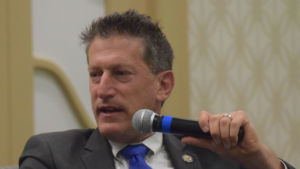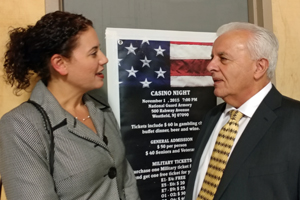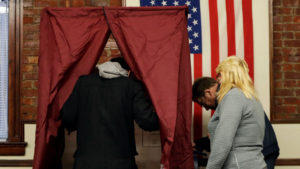by Colleen O’Dea, Senior Writer for NJ Spotlight News – NJ Decides 2021, Politics
March 18, 2021 – Lawmakers want it in place for November’s elections. But there are major tech hurdles and there’s not enough money, county officials say.
New Jersey is on the brink of permitting true early voting with people using machines to cast votes beginning with the election in November when the governor and all 120 seats in the Legislature are on the ballot.
County election officials, however, say the state isn’t ready.
Clerks and election supervisors have a litany of issues with the legislative push to put a true early voting system in place in time for the general election. But they come down to two major concerns: a lack of time and a lack of funding. And that’s on top of existing, significant issues with the state’s online voter registration database, a crucial component to this plan, they warned.
Many elections officials are urging lawmakers to take a more cautious approach and test early voting in a few locations this November before risking chaos by mandating every county offer the opportunity to every voter.
“I understand the impetus,” said Michael Harper, clerk of the Hudson County Board of Elections. “But I just feel it’s too important to rush. I don’t see any issue with getting it right through legislation this year and then really implementing this next year.”
Several lawmakers have been pushing for this change for several years and they don’t want a further delay. Sen. Nia Gill (D-Essex), a longtime sponsor of early voting legislation, said S-2303/A-4830, will “ensure the most effective and efficient voting process possible … (to) expand the access to our most fundamental constitutional right, the right to vote.”
The Senate is poised to give final passage to the early voting bill, next Thursday, March 25. Gill and other lawmakers say New Jersey should join the two dozen other states that allow early voting by machine to ensure everyone who wants to vote can get to the polls, be it on a weekday other than Tuesday or over the weekend when fewer people are working.
Zwicker: ‘A long time coming’

Assemblyman Andrew Zwicker: “It is imperative that New Jersey lead in a nonpartisan way and increase access to voting…”
“This is a long time coming,” said Assemblyman Andrew Zwicker (D-Middlesex), one of the prime sponsors of the bill. “I think it has to be now because of federal or presidential issues. We are seeing Georgia, at the state level, put forth legislation to curtail early voting, curtail vote by mail. They’re responding by undermining our democratic process. And it’s not just Georgia. And I think it is imperative that New Jersey lead in a nonpartisan way and increase access to voting for all New Jerseyans who registered to vote. ”
The legislation would require each county open between three and seven polling places, depending on the number of registered voters, for machine voting for nine days prior to the general election, ending on the Sunday before Election Day. This year, that would be from Saturday, Oct. 23 through Sunday, Oct. 31. Polls would be open Monday through Saturday from 10 a.m. to 8 p.m., and on Sunday from 10 a.m. to 6 p.m. A shorter early voting period would be available prior to primaries and in those municipalities that choose to do so before their nonpartisan May elections.
Under the legislation, each county that does not already have machines with a voter-verifiable paper ballot, or 16 of the 21 counties, would have to purchase enough machines to allow for early voting. These could be either machines that optically scan hand-marked paper ballots or other electronic machines that produce a voter-verifiable paper ballot. Additionally, county boards would have to plan for the security of voting machines, ballots and records during the early voting period. State law requires that all new voting machines put in use in the state must have a paper trail for auditing results.Currently, counties offer early voting using paper vote-by-mail ballots according to schedules they specify. Before last year, though, few voters had used a paper ballot and there was anecdotal evidence that most wanted to be able to vote on a machine.
All counties would have to purchase electronic poll books which would allow poll workers to look up voter registrations in real time and to prevent people from voting more than once. Poll workers would also be able to know if a voter needs ballot marking devices for the disabled and privacy booths. The electronic poll books need to be secure to prevent hacking and they need to work with the Statewide Voter Registration System (SVRS), which continues to be fraught with problems.
Election officials: Where’s the money for this?
The legislation does not include money to pay for all the equipment, county elections officials said.
A fiscal analysis by the nonpartisan Office of Legislative Services (OLS) estimated that it would cost the state a minimum of $28 million to start but could range to $48 million or more. The bill, however, only includes a $2 million appropriation for the purchase of ballot-on-demand printers able to print paper ballots for every voting district in a county that could be marked and voted using an optical scanner, should that equipment be chosen. (OLS estimates four to five printers per site — at 115 sites — would run from $2.3 million to more than $4 million, with each printer costing $5,000 to $7,000.)
Zwicker said the state will have enough money to cover counties’ costs.
Gov. Phil Murphy’s latest budget proposal shows $20 million in state funds available this year and $20 million for the next fiscal year for the implementation of early voting. That still could fall short of what’s needed, according to the New Jersey Association of Counties (NJAC). The association is still collecting information from counties, but so far estimates it would cost $77 million for equipment purchases and another $9 million for poll worker reimbursement annually, but not accounting for continuing operational costs each year, which NJAC Executive Director John Donnadio said “election officials fear will be staggering.”
Hunterdon County Clerk Mary Melfi noted that the language in the bill states that “the state treasury will decide what it will reimburse,” which could mean counties getting only a portion of what they spend on equipment.
Even if the money is available, officials say there is not enough time to implement early voting in November.
Each county would have to go through its procurement process — at least a request-for-qualifications (of vendors) process and in some counties potentially a bidding process — to buy equipment, presuming the vendor has enough stock. Only a few companies provide voting machines and electronic poll books and counties could only purchase equipment authorized by the state Division of Elections, which has not yet provided such a list of approved equipment. A spokeswoman did not respond to questions about when the division might issue its recommendations. County commissioners likely would have to vote at a public meeting to approve the expenditures. It is unclear how long it would take for the equipment to arrive.
Murphy has called often and loudly for the state to put in place a formal early voting system using machines, as two dozen states currently allow. He has not said, however, whether he will sign this specific bill. The longer the governor takes to decide on the legislation, the shorter the time frame for counties to procure equipment, train staff and educate voters on using it.
Worried about ‘the time crunch’
“There are (voting) machine companies that also offer a poll book; there are independent poll book companies, and these are all things that we’re looking at,” Harper, of the Hudson County Board of Elections, said. “But it’s the time crunch of, okay, let’s do this for November, is just — it’s too much.”
Zwicker said state and county officials have had ample notice that early voting is on track to become law.
“They’re well aware that … expedited procurements are going to be necessary,” he said. “I totally get it, but I’m also confident that we can get this done.”
But Beth Thompson, administrator of the Hunterdon County Board of Elections, said the counties don’t even know how much equipment they might need.
“The state is not giving us guidance yet on how many machines do they expect you to provide to the public,” she said.
The OLS estimate assumes four or five scanners or 10 paper-trail machines and four or five ballot printers for each of 115 early voting sites and two E-poll books for each of the state’s 6,400 voting districts.
Proper training on new equipment would be crucial to ensuring a smooth early voting process, officials said. New technology often comes with a learning curve and many poll workers are older and less tech-savvy, so training them to operate new machines and E-poll books could take extra time.
In most of the counties that would need to purchase new equipment, there would also be a need to teach voters how to use it. Last year, many voters balked at the idea of filling out a paper mail-in ballot, rather than being able to vote on a machine, but in the end, most who voted by mail completed their ballots and assembled the envelopes properly. Early in-person voting would leave most voters trying to use a new machine while others wait in line.
Need to train staff, educate voters
Nicole DiRado, superintendent of elections in Union County, said her office conducted hundreds of in-person trainings when the county was switching from old direct-recording electronic voting machines to the new paper-trail machines it now uses.
“You’re educating the poll workers, you’re educating voters, you’re educating election board staff,” she said. “There’s programming challenges, there’s education challenges, voter outreach challenges and financial challenges. They’re real challenges we’re willing to take on, as an association and as a profession. We believe in this. But we need to do it right the first time.”

Nicole DiRado, administrator of Union County’s Board of Elections and John DeSimone, chairman of the board
Should everything else work out, the election officials said they are worried the Statewide Voter Registration System won’t be up to the task. The Division of Elections told OLS it would cost $600,000 for a vendor to develop an interface between the system and the electronic poll books.
But officials say the system continues to be plagued with issues ranging from placing voters in the wrong voting district or sometimes wrong municipality to not finding duplicate registrations when new registrations come in daily from motor vehicle transactions. Most recently, last week, the system was spitting out multiple ballot labels for each individual voter for upcoming fire district elections
“Nobody wants to be negative, negative, negative, but the issue starts with the Statewide Voter Registration System,” Thompson of the Hunterdon County Board of Elections said. “With every new piece of legislation that is created, that creates changes within the Statewide Voter Registration System that is a delay on the functionality that we’re trying to get fixed, that we’ve been dealing with for over a year.”
Zwicker acknowledged the problems with the registration system that must be fixed for early voting to work properly, but said that will happen.
“I’ve talked to people there and they’re working day and night to upgrade the system to be ready, not just for early voting, but from the lessons learned from this past November,” he said. “I’m confident they will get it done.”
How about testing it first?
County officials suggested that instead of mandating an untested system statewide in November, the state choose a few counties or let counties choose a few municipalities for early voting to test how the Statewide Voter Registration System works, and correct any flaws before a statewide rollout.
Union County’s test run in November 2018 of the Express Vote XL machines that have a voter-verifiable paper trail was vital to successfully showing that the machines could be used throughout the county. The system the county set up in Westfield, where the machines were tested, had workers give each voter a sheet of paper to be inserted into the machine for verification purposes after they signed in. But that Election Day was rainy and while waiting in line to vote, some people crinkled the paper; others got it wet, which led to some paper jams. In addition, lines were long both because of the unexpectedly high turnout for the midterm and because election workers had to spend extra time showing some people how to use the machines.
Zwicker said that since so many states have successfully used early machine voting for years, their experiences provide New Jersey with valuable lessons.
“We can handle it,” he said. “We just have to make sure our infrastructure works and our people are trained. In my mind, the pilot doesn’t really get us anywhere. I also think this is too important. This should be for every New Jerseyan, not for just a handful of places.”
“I’d like to know how other states rolled it out,” DiRado said.
Testing early voting in the state could expose some problems no one considered, she continued. For instance, with COVID-19 likely to continue, poll workers should be cleaning the electronic poll books after each voter. One question a sample test run could answer is how many swipes with an alcohol wipe can a tablet take and still work properly?
“Have one early voting center where I have one set of poll workers where it’s limited to maybe two or three towns who can go there, and pay for it, and let’s see how it goes,” DiRado said. “We support it. It just needs to be rolled out in phases before you can send a full-on early voting program statewide with no money.”

